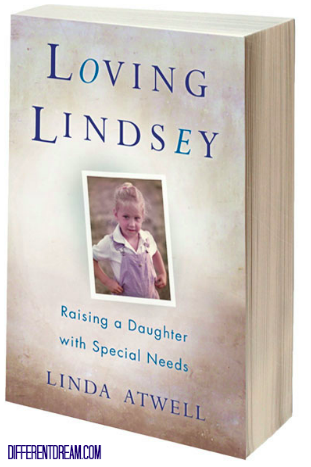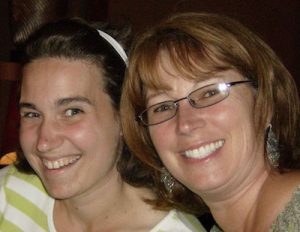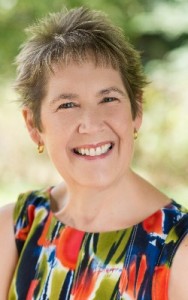Why I Wrote Loving Lindsey: An Interview with Linda Atwell

Different Dream is pleased to welcome Linda Atwell as today’s guest blogger. Linda is here to talk about and answer our questions about her new book, Loving Lindsey: Raising a Daughter with Special Needs. We hope you enjoy getting to know Linda as much as we did and that, perhaps, you’ll purchase her new book.
Why Linda Atwell Wrote Loving Lindsey: An Interview with the Author
Question 1: Did you know immediately after birth that your daughter would have special needs?
When I was pregnant, the only baby my mind ever visualized was a healthy one, and when my daughter was born, I thought my dearest dream had been granted. Lindsey had impressive Apgar scores—the evaluations taken right after a baby is born that tells doctors and nurses how well your infant did coming into the world, then five minutes later to find out how she was adjusting to her new environment. Lindsey scored eight and nine—out of ten. Then she excelled in her early development. Based upon the developmental milestones, she rolled over, crawled, talked, and even walked on time.
Question 2: So, when did things change?
At 16 months, my inquisitive, beautiful toddler suffered a grand mal seizure and developed essential tremors. Although she’d had no visible problems with gross motor skills, fine motor skills confounded her. She could not coordinate the small muscle movements in her fingers, hands, or eyes. She wasn’t making friends or keeping up with her peers in school. In the 1980s, when Lindsey was 6, doctors at Oregon Health Science University diagnosed her as “mildly mentally retarded” (a term I despise and rarely use)—from an unidentified syndrome, but most likely from an undiagnosed birth defect. They told me that when she became an adult, she would likely live in a group home.
Question 3: What lifestyle did you hope for your daughter’s future?
After coming to terms with my daughter’s diagnosis, I learned that what I wanted more than anything (just like the mother of a typical kid), was for my girl—despite her intellectual disabilities—to live an independent life, to have purpose, and to find love. Fortunately, Lindsey wanted those things for herself. In fact, she demanded them. But with such goals, there are also challenges.
Question 4: How did Lindsey handle independence?
Lindsey plunged into adulthood and experimented with sex, decided to have a tubal ligation, then ran away with a man more than twice her age to live in a house with tinfoil taped over the windows. As she grew closer to Emmett, she withdrew from us. But because she was twenty, and it was not illegal in Oregon to pick a bad partner, law enforcement could not help us. It took 4 1/2 years to bring our daughter home.
Question 5: Why did you write Loving Lindsey?
Initially, I felt the need to get our story down on paper. But as I wrote, I wondered if our story might have turned out differently if I’d been aware of Lindsey’s rights as an adult, or the traits of people who prey on our most vulnerable young adults—whether or not they have a mental disability. So by sharing, I hoped it would help others.
Question 6: What do you hope the reader learns from your book?
Our story includes moments of love and pride, as well as the times our family struggled. It shares the successes people with special needs can achieve when offered parental, educational, and community support. Although the challenges for independent living will vary from child to child, and family to family, kids with special needs often have more abilities than we might initially think. Our daughter continues to surprise us all the time. And, truth be told, that is the story I really wanted to tell.
Do you have questions for Linda or about her book, Loving Lindsey? Leave them in the comment box if you like!
Do you like what you see at DifferentDream.com? You can receive more great content by subscribing to the quarterly Different Dream newsletter and signing up for the daily RSS feed delivered to your email inbox. You can sign up for the first in the pop up box and the second at the bottom of this page.
 Linda Atwell earned her BA from George Fox College. She owned a successful home décor business for ten years before switching to adjusting catastrophe insurance claims and climbing roofs for a living. Now she writes award-winning work that has appeared in print and online magazines. Her first book, Loving Lindsey: Raising a Daughter with Special Needs was recently released by She Writes Press. Linda irregularly writes a blog about her daughter with special needs. She hopes to get 50 stamps in her passport before it expires. Linda and her husband John live in Silverton, Oregon. They have 2 incredible adult children.
Linda Atwell earned her BA from George Fox College. She owned a successful home décor business for ten years before switching to adjusting catastrophe insurance claims and climbing roofs for a living. Now she writes award-winning work that has appeared in print and online magazines. Her first book, Loving Lindsey: Raising a Daughter with Special Needs was recently released by She Writes Press. Linda irregularly writes a blog about her daughter with special needs. She hopes to get 50 stamps in her passport before it expires. Linda and her husband John live in Silverton, Oregon. They have 2 incredible adult children.

By Jolene
Jolene Philo is the author of the Different Dream series for parents of kids with special needs. She speaks at parenting and special needs conferences around the country. She’s also the creator and host of the Different Dream website. Sharing Love Abundantly With Special Needs Families: The 5 Love Languages® for Parents Raising Children with Disabilities, which she co-authored with Dr. Gary Chapman, was released in August of 2019 and is available at local bookstores, their bookstore website, and at Amazon.
2 Comments
Submit a Comment
Subscribe for Updates from Jolene
Related Posts
We’re Proud of our Kids with Special Needs!
Guest blogger Steve Harris takes a time out to remind us how true it is that we’re proud of our kids with special needs.
A Song for Encouragement
Musician Steve Siler presents his song, “Whole in the Sight of God,” a song for encouragement of families impacted by disability.
When Pets, Bracelets, and Autism Come Together
Guest blogger Heather Braucher explains the magic that happens when pets, bracelets, and autism come together.






Claudia, thanks for letting Linda know how much the book meant to you. Jolene
I LOVED your book so much I could hardly put it down. So real.
I related to your feelings all too well. Thank you for taking the time to write your story.
For one, it encouraged me in many ways.